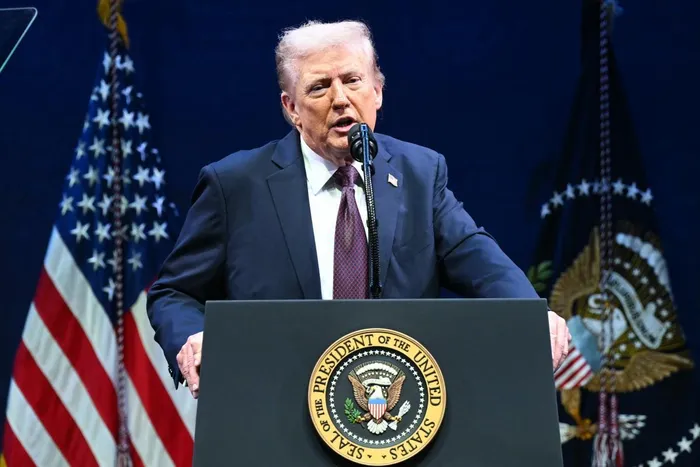Afrikaners support South Africa's unity and oppose Trump's offer of refugees
'DANGEROUS AND FALSE' NARRATIVE

US President Donald Trump's claims that his administration is focusing on Afrikaans-speaking South Africans have sparked significant backlash. Critics are voicing their concerns and questioning the implications of such a prioritisation.
Image: AFP
A group of well-known South Africans who speak Afrikaans have issued a statement denouncing the US government's recent decision to give white South Africans priority for refugee status, calling the underlying narrative "dangerous and false."
An article titled "Not in our Name: Afrikaners Respond to the Misuse of Their Story in US Politics," which was published on Saturday, expressed this group's condemnation and received a lot of support, including the ANC's strong endorsement.
The controversy stems from a perceived US decision to offer preferential refugee status to white South Africans, a move interpreted by many as an echo of far-right ideologies.
However, the signatories, comprising nearly 50 academics, church leaders, and other professionals, have vehemently distanced themselves from this framing, asserting their identity as integral to a diverse and evolving South African nation.
"We reject the US narrative that casts Afrikaners as victims of racial persecution in post-apartheid South Africa," stated the group in their response.
They warned that this framing, now being used to support the far-right 'Great Replacement' theory in the United States, is not only misleading, but also dangerous.
"It distorts the realities of South Africa, weaponises our history, and reduces a complex social context and necessary levelling of playing fields into a simplistic symbol of white decline."
While acknowledging that South Africa faces "serious challenges – crime, inequality, and the enduring legacy of apartheid," the Afrikaner signatories pointed out that "these issues affect South Africans of all races".
The ANC through its spokesperson Mahlengi Bhengu, said it welcomed what it called the "courageous stance" taken by these Afrikaans-speaking South Africans.
Bhengu highlighted that their actions affirm that "nation-building requires honesty about our painful past and a shared commitment to redress the deep inequalities caused by centuries of oppression".
The party further noted with appreciation the "clear rejection of attempts to distort South Africa’s history and weaponise it to advance far-right agendas abroad".
"We commend these South Africans for asserting that they are not pawns in the culture wars of other nations but citizens of a free South Africa, one that continues to grapple with its past while striving for a better future for all who live in it," Behngu added, emphasising the shared commitment to a unified and equitable future for all South Africans.
Bhengu said that the Afrikaners’ statement affirms that "true patriotism lies in facing the truth and building bridges of understanding, not denying the lived unequal realities of our people".
This, she said, aligns with the spirit of reconciliation envisioned by South Africa's founding leaders, who declared that “South Africa belongs to all who live in it, black and white".
The ANC also seized the opportunity to reiterate that the "transformation and redress agenda is not an act of charity but a moral, legal, and constitutional obligation to correct those historic wrongs and create a society based on equality, justice, and shared prosperity".
The party urged all South Africans, including those from communities once privileged by apartheid, to join hands in "completing the unfinished business of liberation" to ensure full transformation, equality, and social justice are achieved.
Political analyst specialising in South African social movements, Dr Sipho Dlamini praised the Afrikaner group's intervention as critically important for several reasons.
"Firstly, it decisively debunks the false narrative of white persecution in South Africa that is often peddled by international far-right groups. This group, representing a significant voice within the Afrikaans community and is actively dismantling the very foundation of the US's questionable refugee offer."
"Secondly, their statement strengthens the discourse of national unity and reconciliation. By unequivocally stating their identity as South Africans striving for a just future, they are rejecting attempts to divide the country along racial lines for external political gain. This is a powerful message to both domestic and international audiences that South Africa's future is one of shared responsibility and collective progress,” Dlamini said.
mashudu.sadike@inl.co.za
Related Topics: